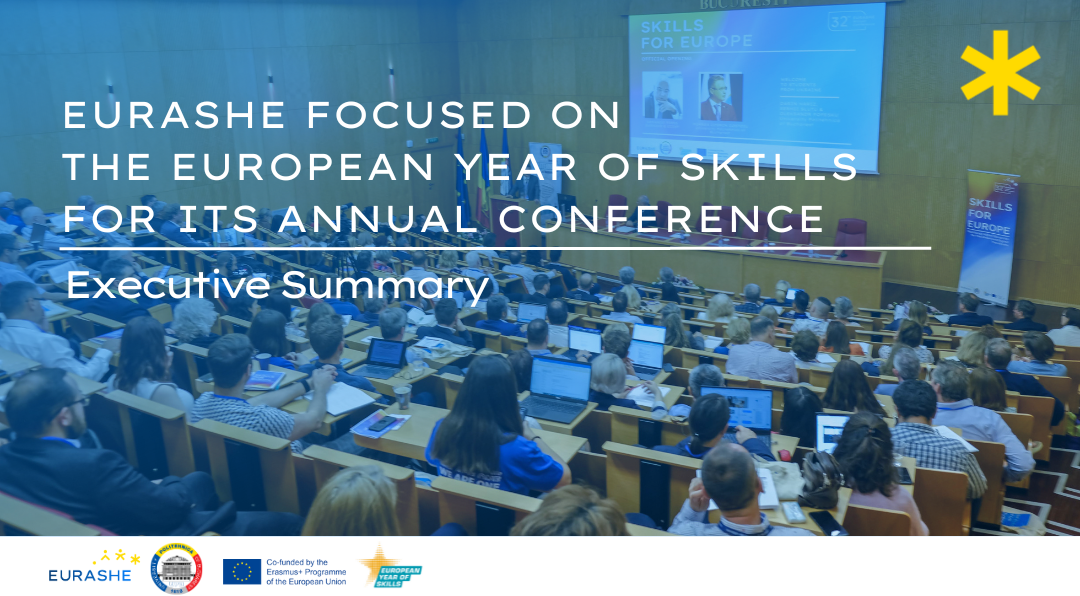EURASHE recently held its 32nd Annual Conference in Bucharest, Romania, entitled ‘Skills for Europe: Mobilising Higher Education for the Green and Digital Transitions’. It made an important contribution to the European Year of Skills, that was launched by the European Commission on May 9.
The Conference took place at the Polytechnic University of Bucharest (UPB), a member of EURASHE, bringing together 160 participants from 21 countries. All the keynote speeches and panels were orientated towards the development of skills, which is a core concern of applied higher education institutions. Furthermore, there was a lively discussion in 20 breakout sessions, which allowed members and partners to showcase their activities and receive valuable feedback.
The Conference started just after the EURASHE General Assembly, which saw Prof. Armando Pires stand down as President following six years of service on the Board. In his opening remarks to the Conference, he asserted that applied higher education institutions provide technical and horizontal skills, helping to fill labour market shortages and harness talent. This was illustrated by Prof. Mihnea Cosmin Costoiu, Rector of the Polytechnic University of Bucharest, who gave examples of how the University is addressing regional knowledge needs and supplying skilled labour for growth industries. Furthermore, Prof. Costoiu underlined that collaboration and collective action were underscored as crucial elements for progress. He also expressed gratitude to the community of Ukrainian students that are contributing to the University’s diverse and inclusive community. During the opening session, there was also an emotional exchange with several Ukranian students, who shared their testimonies on the challenges of fleeing war and continuing their education in another country.
The first keynote speech by Bogdan Cristescu, Romanian State Secretary, addressed challenges facing his country and Europe as a whole, including the importance of promoting a more inclusive system and addressing technological transformation in sectors at the forefront of the green and digital transition. By 2030, it is projected that 41% of jobs will require higher qualifications, making Higher Education Institutions (HEIs) crucial in training learners for the evolving workforce. He reminded us that the advent of the fifth Industrial Revolution emphasises the importance of acquiring digital and innovation skills, not just those related to technical expertise. The keynote speech was followed by a policy round table on the European Year of Skills, addressing Higher Education’s key role in equipping students with the right skills for the labour market. The national perspective of the Romanian government was complemented by perspectives from the European and regional level.
Panel debates on day one focused firstly on the Labour Market, revealing the vital role of collaboration between Higher Education Institutions and Businesses of different sizes, always conditioned by the local context, and secondly on Applied Research, addressing the importance of linking research with education and how all European regions should strive to be excellent places to research and an innovate.
On June 9, the day started with a keynote speech by Arno Meerman, CEO of UIIN, on the profile of a boundary-spanning champion and how to enhance external engagement by providing them with the appropriate support to help them unleash their entrepreneurial spirit and freedom. He highlighted how a new Dutch government programme to promote cooperation at the regional level between education and enterprise is dominated by applied HEIs. The Conference was concluded with more parallel sessions and a final panel discussion on Quality Assurance, stressing the need for a reinforced set of European Standards and Guidelines to support innovative teaching and learning within the European Higher Education Area.
The closing ceremony, started with the PHE Star Awards. These awards were given to participants that shared a good practice or a project during the parallel sessions. The Conference Programme committee gave the awards, and these were the winners:
- PHE Star Award for Regional Dimension
- Leading from the North West of Ireland – Paul Hannigan, Joanne Kilmartin, Atlantic Technological University; Maria Doherty, Donegal Education & Training Board; Wendy Gibbons, North West Regional
- PHE Star Award for Research and Innovation Competences
- RECAPHE: a cooperative process to develop tools for enhancing staff research and innovation capacity in Professional Higher Education – Nijolé Zinkeviciené, Vilniaus Kolegija, Higher Education Institution; Ruth Moran, Atlantic Technological University Sligo
- PHE Star Award for Addressing Labour Market needs
- Inclusion in Higher Education, Dealing with the challenges of diversity and multiculturalism – José Reis Jorge; Marco Ferreira, ISEC Lisboa
- PHE Star Award for Future Skills and Competences
- Let’s profile the 2030 graduate – Joana Ferreira, Leiria polytechnic – run-eu
- PHE star award for Digitalisation
- PROFFORMANCE Assessment tool as navigator for teachers’ competences needed to prepare students for future jobs – Jan Beseda, Centre for Higher Education Studies, CASPHE
The newly elected EURASHE President Prof. Hannes Raffaseder shared his vision for the Association over the next two years and invited participants to the 33rd Annual Conference, which will happen in St. Pölten, Austria, in May 2024.
From EURASHE, we would like to thank every participant and speaker joining us from around Europe. A more extensive Annual Conference report will be published in the upcoming weeks.
You can have a look at the Conference pictures here.


